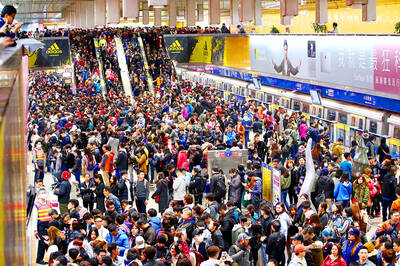Experts and public interest groups yesterday condemned moves to change rules on food labeling, saying that public health should not be compromised.
The Ministry of Health and Welfare has said the mandatory registration of compound additives proposed in an amendment to the Act Governing Food Sanitation (食品衛生管理法) is not “geared toward the global trend.”
Lin Chung-yin (林中英), a post-doctoral researcher of clinical toxicology at Chang Gung Memorial Hospital, said that the “global trend” is based on rigorous oversight of factories that manufacture the additives, which is absent in Taiwan.
Factories in other countries need to be registered with their governing authority and overseen by certified food technicians, Lin said.
“Therefore for them no mandatory registration of compound additives is required,” Lin said.
However, there is no effective monitoring mechanism for such factories, many of which are not even properly registered, she added.
Perry Chiu (丘志威), a former professor of food science at Fu Jen Catholic University, agreed with Lin.
“Many raw material suppliers in the nation also sell food additives, but since they are not registered as food additive manufacturers, the Food and Drug Administration said it is not responsible for their operations,” he said.
“However, when the Environmental Protection Administration was asked questions about the jurisdiction, it said it was only in charge of the four classes of toxic chemical substances [defined in the Toxic Chemical Substances Control Act, 毒性化學物質管理法],” he added.
The lack of supervision has contributed to the outbreak of food scandals in recent years, in which Taiwanese food manufacturers were found to be producing food adulterated with industrial chemicals, including substituting plasticizers for emulsifiers and mixing maleic acid with modified starch, Chiu said.
Chiu said he doubted the country’s trade would be seriously affected by the proposed amendment.
He said the excuse of “manpower insufficiency” often brought up by health authorities whenever mandatory registration is enforced was not valid.
“The government is squandering money on many unnecessary projects that could otherwise be used to commission professional groups to conduct the checks,” Chiu said.
Hsu Hui-yu (許惠玉), head of the John Tung Foundation’s food nutrition section, agreed.
“An earlier proposal to have food ingredients listed in order of predominance, a practice implemented in many countries to deter dishonest marketing, was brushed aside by the agency, which said it was incapable of conducting such checks due to a lack of manpower,” Hsu said.
National Taiwan University agronomy professor Warren Kuo (郭華仁) was also dissatisfied with the current draft, which he said included only a couple of articles regulating genetically modified (GM) food, an underperformance compared with the EU, China, Japan, South Korea and Australia’s thorough GM food-targeted regulations.
The amended draft is to be discussed in the legislature today.

People can take the Taipei MRT free of charge if they access it at Nanjing Sanmin Station or Taipei Arena Station on the Green Line between 12am and 6am on Jan. 1, the Taipei Department of Transportation said on Friday, outlining its plans to ease crowding during New Year’s events in the capital. More than 200,000 people are expected to attend New Year’s Eve events in Taipei, with singer A-mei (張惠妹) performing at the Taipei Dome and the city government’s New Year’s Eve party at Taipei City Hall Plaza, the department said. As people have tended to use the MRT’s Blue or

Civil society groups yesterday protested outside the Legislative Yuan, decrying Chinese Nationalist Party (KMT) efforts to pass three major bills that they said would seriously harm Taiwan’s democracy, and called to oust KMT caucus whip Fu Kun-chi (傅?萁). It was the second night of the three-day “Bluebird wintertime action” protests in Taipei, with organizers announcing that 8,000 people attended. Organized by Taiwan Citizen Front, the Economic Democracy Union (EDU) and a coalition of civil groups, about 6,000 people began a demonstration in front of KMT party headquarters in Taipei on Wednesday, organizers said. For the third day, the organizers asked people to assemble

Taipei is participating in Osaka’s Festival of Lights this year, with a 3m-tall bubble tea light installation symbolizing Taiwan’s bubble tea culture. The installation is designed as a bubble tea cup and features illustrations of Taipei’s iconic landmarks, such as Taipei 101, the Red House and North Gate, as well as soup dumplings and the matchmaking deity the Old Man Under the Moon (月下老人), affectionately known as Yue Lao (月老). Taipei and Osaka have collaborated closely on tourism and culture since Taipei first participated in the festival in 2018, the Taipei City Department of Information and Tourism said. In February, Osaka represented

Taiwanese professional baseball should update sports stadiums and boost engagement to enhance fans’ experience, Chinese Professional Baseball League (CPBL) commissioner Tsai Chi-chang (蔡其昌) told the Liberty Times (sister paper of the Taipei Times) in an interview on Friday. The league has urged Farglory Group and the Taipei City Government to improve the Taipei Dome’s outdated equipment, including relatively rudimentary television and sound systems, and poor technology, he said. The Tokyo Dome has markedly better television and sound systems, despite being 30 years old, because its managers continually upgraded its equipment, Tsai said. In contrast, the Taipei Dome lacked even a room for referees